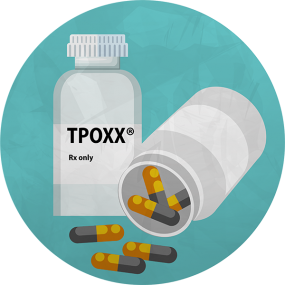Patient’s Guide to Mpox Treatment with TPOXX (tecovirimat)
Oral TPOXX (tecovirimat) for treatment of mpox is primarily available through the Study of Tecovirimat for Mpox (STOMP). Healthcare providers should see CDC’s TPOXX Expanded Access IND Information page for more details.
- TPOXX is FDA-approved only for treatment of smallpox.
- Animal studies show TPOXX may potentially help to treat the type of virus that causes mpox, and we are learning more about how it works and whether it helps to treat mpox in people.
- TPOXX is an experimental (investigational) drug that is still being tested in people with mpox to find out if it is safe and effective.
- TPOXX is only available through the Study of Tecovirimat for Mpox (STOMP) clinical trial or CDC’s expanded access (compassionate use) program.
- If you have mpox symptoms, visit a healthcare provider, even if you’ve had the mpox vaccine. You can also contact the STOMP trial for more information about enrolling by calling 1-855-876-9997.
- You can enroll in-person at a study site. If you’re not near a study site or unable to attend in-person visits, you can enroll remotely (available Monday through Friday only).
- Oral TPOXX for treatment of mpox is primarily available through STOMP.
About TPOXX

- TPOXX is FDA-approved only for treatment of smallpox.
- Animal studies show TPOXX may potentially help to treat the type of virus that causes mpox, and we are learning more about how it works and whether it helps to treat mpox in people.
- However, because there are not enough data to say whether tecovirimat is safe and effective for treating people who have mpox, tecovirimat is still considered an investigational drug for mpox. Investigational means the drug is still being tested to determine whether it is safe and effective to treat a specific disease.
- Because TPOXX is investigational, it is only available through a clinical trial called the Study of Tecovirimat for Mpox (STOMP) or CDC’s expanded access (compassionate use) program.
- If your healthcare provider thinks you have mpox, they may ask you to consider taking part in STOMP.
- The trial is being conducted by the National Institute of Allergy and Infectious Diseases, a part of the National Institutes of Health.
- If you are not eligible for enrollment in STOMP or decide not to take part, your provider might still prescribe TPOXX for you if you are eligible under CDC’s expanded access (compassionate use) program.
If you have or are at risk of severe mpox
If you are not eligible for enrollment in STOMP or decide not to take part, your provider might still prescribe TPOXX for you if you are eligible under CDC’s expanded access (compassionate use) program. This is largely for people who have or are likely to get a long-lasting, life-threatening case of mpox because they have a severely weakened immune system or certain active skin conditions.

People who are at higher risk of long-lasting or life-threatening illness include:
- People with severely weakened immune systems, such as people with HIV that is not controlled; leukemia or lymphoma; autoimmune diseases; or who are undergoing chemotherapy or had an organ transplant
- People with active skin conditions that can cause widespread infection, such as atopic dermatitis, eczema, burns, impetigo, active herpes, psoriasis, or Darier disease
- People who have sores that cover 25% or more of their skin
- People whose airways, heart, or nervous systems are affected by the disease
- People with sores on or around the eyes
- People who are pregnant or breastfeeding
- Children under 18 years old
People with these conditions can join the STOMP trial as part of a group called “open-label arm,” in which everyone gets TPOXX.
People who don’t have these conditions may still be able to get TPOXX by joining the STOMP trial’s randomized arm, in which two-thirds of the group gets TPOXX.
Why TPOXX is not prescribed for everyone
- Because TPOXX is not FDA-approved for mpox and is only available under special permission from FDA, healthcare providers can only prescribe TPOXX to certain people with mpox who qualify for treatment.
- When TPOXX is prescribed too often to people with milder mpox symptoms, it may increase the chance that the virus that causes mpox will develop resistance to the medication. This means the drug might no longer work for mpox.
- U.S. government health agencies are taking steps to reduce the possibility of resistance from happening by making TPOXX available only through STOMP or through the expanded access program. These two routes help to ensure appropriate use of the drug. Healthcare providers must only prescribe TPOXX under expanded access to people who have or are at risk of long-running or life-threatening illness.
Contact a healthcare provider
- If you have mpox symptoms, even if you’ve had the mpox vaccine.
- To find out if TPOXX is right for you.
- If your mpox symptoms get worse.